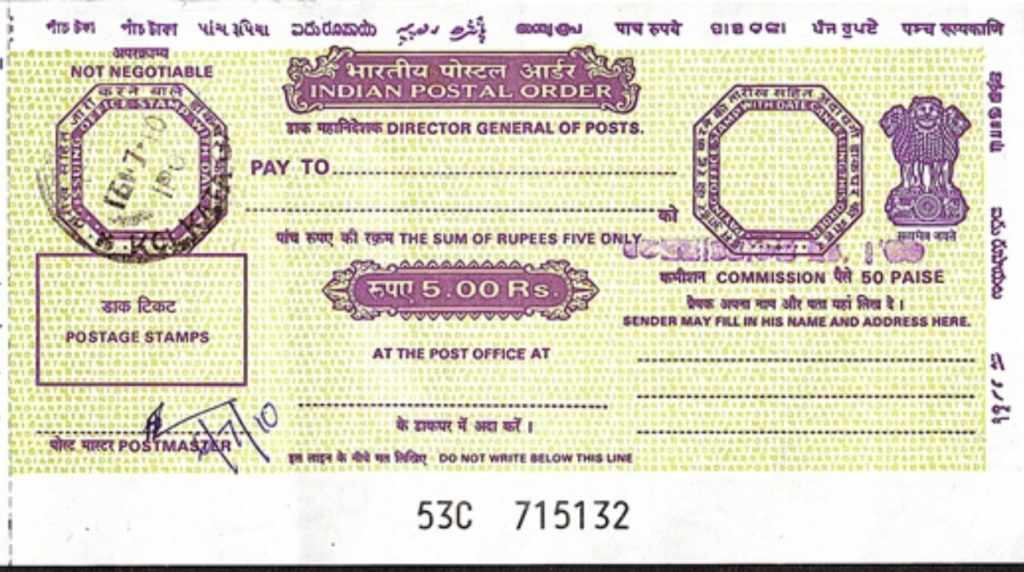The Story of the RTI application about IPOs

[orc]Here is a story about one of the RTI applications we filed with the Department of Posts. We found that common sense could have saved the government both money & resources.
In an effort to bring out various facts & information into the public domain, we often use Right to Information (RTI) at Factly. Recently, we filed an application under RTI with the Department of Posts, Government of India seeking information on numbers related to the Indian Postal Order (IPO). What followed provided great insights into how government departments waste public money without batting an eyelid. It also exposed the poor data management in the department.
Background
Indian Postal Orders (IPOs) provide a convenient means of transmitting small sums of money by post. They come in various denominations starting from Re 1. While the use of IPOs in normal course has come down in the last decade or so, they are being used in filing applications under the RTI act. The IPO is a valid mode of payment for both the application fee and the additional fee under the RTI act. Apart from the Central Government, many State Governments also accept IPO as a valid mode of payment. In 2013, Department of Posts launched the e-IPO facility for Indian Citizens living abroad. This has been extended to those living in India in 2014. Arguably, IPO is the easiest & the preferred mode of payment of RTI fee for most citizens.
Our motivation in filing a RTI application on IPOs was to understand if demand for IPOs has increased after the RTI act came into force in 2005 and also to validate the claim that there is a shortage of IPOs. Many newspapers reported shortage of IPOs in post offices leading to citizens facing hardships in filing RTI applications. We filed an application to know the following,
- Number of Indian Postal Orders (IPOs) of different denominations sold in each of the last 10 years
- Amount of commission earned on the sale of these IPOs
- Number of IPOs of different denominations printed in each of the last 10 years.
Expenditure of Rs 10000 or more in sending the response
The concerned Public Information Officer (PIO) in the Department of Posts duly forwarded the application to all heads of circles who in turn forwarded it to various head post offices and so on. By last count, we received about 200 letters from various parts of the country. We expect more in the days to come and the count might reach 500 by conservative estimates. Most of these were responses were sent via speed post. Even assuming a minimum expenditure of Rs 20 per letter in postal charges, we are looking at a total expenditure of Rs 10000 in sending a response to our application.
Same application, multiple interpretations
Though the same application was forwarded to various circles and post offices, there were multiple interpretations of the same. Some of the responses received are the following
- The information is not maintained in that format and hence cannot be given
- No such information is available with us
- The response from Varanasi had information on number of IPOs sold and encashed
- The response from Bhilwara had detailed information on number of IPOs sold by denomination including the commission earned.
It is impossible for the Bhilwara circle to provide information if it is not maintained in some central server in the specified format. Still, many responses simply said that the information is not maintained or no such information is available with them. In either case, they must be lying.
The Right hand does not know what the Left hand is doing
The way Department of Posts responded to the application exposes both the shortsightedness and poor data management in the department. Out of the 3 bits of information sought in the original application, two bits of information is already available with the Department of Posts in a consolidated form. After a little bit of research, we found that the annual report of the Department of Posts has consolidated information circle wise on number of IPOs sold in a particular year, value and commission earned. It also has information on cost incurred on printing the IPOs.
The only other piece of information sought in the application was about the number of IPOs printed in each year. The Department of Posts should have had this information since the indent for printing goes from the department. But still it forwarded the application to the various security printing press across the country. The Security Printing Press in Hyderabad responded.
Poor Data Management & Sheer waste of Public Money/Resources
If the Department of Posts had shared the web link of the Annual Report and informed us the presence of the consolidated numbers in the annual report, it could have saved precious public money & the time of hundreds of government officers. It is appalling to see them waste public money without batting an eyelid.